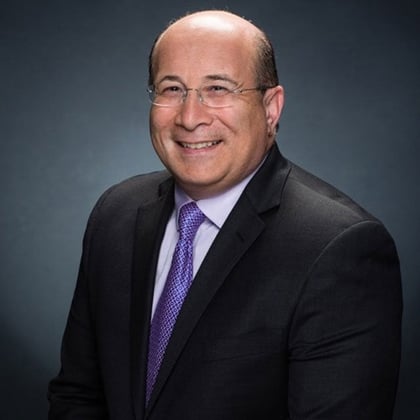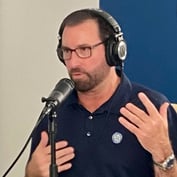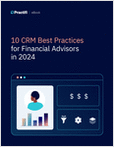Veteran broadcast journalist Ron Insana, who joined Dynasty Financial Partners as chief market strategist in July, is helping the firm’s RIA partners invest clients’ assets with his forecasts for the economy and markets.
He provides his insights to Dynasty’s investment committee as well as to those of the firm’s network RIAs.
In a recent interview with ThinkAdvisor, he discusses the economy and stock market, including developments that the Federal Reserve needs “to take greater note of,” as he frames it.
The Fed will start cutting interest rates next year “to keep any slowdown from becoming a meaningful recession,” Insana argues.
He expects a “mild recession” next year and sees nothing “on the horizon that makes [him] feel that 2008 is around the corner again,” he says.
During his long career as a TV anchor, Insana has interviewed such leaders as presidents Bill Clinton and George Bush; Mikhail Gorbachev, former president of the Soviet Union; and financial moguls, like Warren Buffett and George Soros.
Insana will be a featured speaker at Dynasty’s Investors Forum/23, in Nashville, Tennessee, from Nov. 13-15. There, he will interview Libby Cantrill, head of public policy at PIMCO.
Insana, 62, a regular contributor to CNBC who also presents his views on MSNBC and NBC, started his career in 1984 at the Financial News Network, later acquired by NBC and merged with CNBC. In 2006, he left to start a hedge fund.
In the phone interview with Insana, who was speaking from Englewood Cliffs, New Jersey, where he is based, he discusses running that business during the global financial crisis: “It was a phenomenal learning experience … [but] the timing was unfortunate.”
Here are highlights of our conversation:
THINKADVISOR: You’re a pioneer in financial journalism and have also been an asset manager. What prompted you to take the post of chief market strategist at Dynasty?
RON INSANA: I spent a long time working on the other side of the financial business, not just talking about it but actually engaging in it.
Dynasty was an opportunity to have a senior position at a growing firm that built a very large platform for independent advisors, a space that I think is going to grow even larger over time.
What I’m doing at Dynasty feeds off everything I’ve done over the course of the last 40 years, which is to gather and disseminate information.
It’s just doing it in a different vertical.
As a journalist, you interviewed many VIPs on television. Are you doing any interviews at Dynasty?
At our content events, I get to interview people about financial markets.
We’ll be bringing in interesting people in government and the financial community to have dialogues with.
Our network advisors can have access to some of the people I’ve come to know over the course of my career.
[My interviewing] will be a very similar experience to doing it on TV, but we’re doing it in a private setting.
Who will you interview at Dynasty’s Investors Forum/23?
Libby Cantrill [PIMCO’s head of public policy] about the intersection of politics and geopolitics on the market and economy.
And our CIO, Bob Shea, and I will have an on-stage conversation about our shared views of the global economy and markets for 2024.
How are you helping Dynasty’s advisor firms to grow?
I’m on the investment team, which means I help set parameters for our OCIO [Outsourced Chief Investment Officer] platform [focused on a range of asset classes including alternative investments]. It’s a tool advisors can use to invest their clients’ money.
I meet with the RIAs on our platform, and though I’ve only been at Dynasty 2 1/2 months, I have had some very productive meetings.
I’ve shared my insights and thoughts of where I think markets and the economy are headed, what asset allocation models should look like, what opportunities exist in alternative investments that we have access to.
How do you advise Dynasty’s leadership when it comes to investment strategy, market intelligence and business development?
I get deeply involved [forecasting] the trajectory of the economy and how that will shape the way we approach our investment process and share that with our OCIO [platform], TAMP and other programs that are available to our advisory firms in making investment decisions on behalf of their clients.
I assist the management team in any way they require to identify prospective investment advisors who might want to make a change and then help to educate them on the difference between being independent and being inside a larger firm; and I meet with their clients, if desired.
On the development side, I’ve been here for only a few months. But I know a lot of individuals in the investment advisory community and am more than willing to make the case for independence.
What’s your outlook, then, for the economy?
I’m reasonably upbeat about the U.S. economy. I understand that the risk of recession is out there and think we’ll probably have a mild one next year.
But at the moment, the U.S. is growing fast with less inflation than other countries and has fewer major problems when compared to other large economies, like China or Europe.








 November 03, 2023 at 10:56 AM
November 03, 2023 at 10:56 AM












 Copyright © 2024 ALM Global, LLC. All Rights Reserved.
Copyright © 2024 ALM Global, LLC. All Rights Reserved.